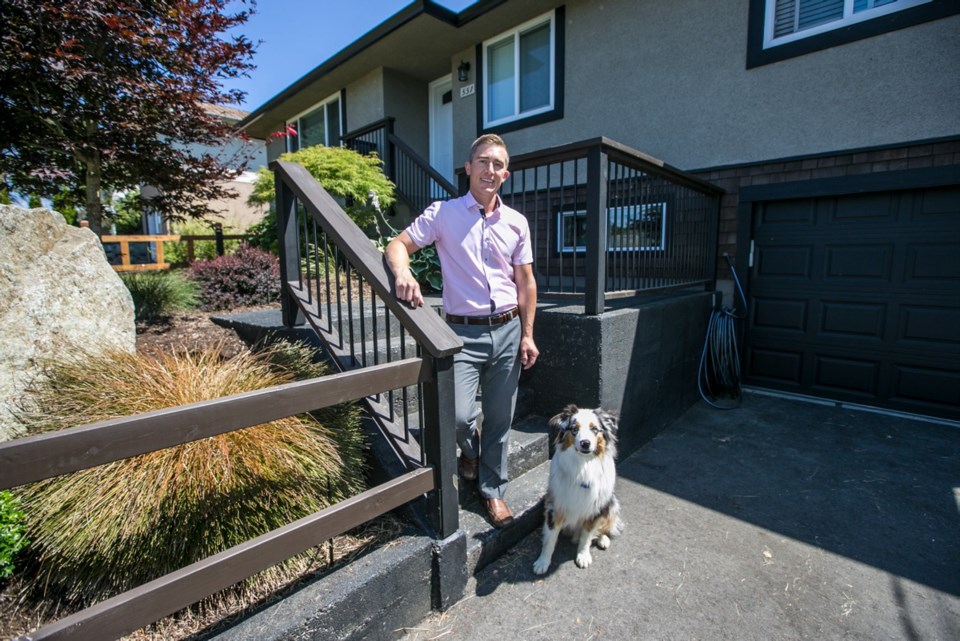First-time homebuyers and owners about to renew their mortgages are nervous about the first benchmark interest-rate hike, a Victoria mortgage broker said Wednesday.
The increase, the first in nearly seven years, might prompt some people to lock in their mortgage rates, Colleen Flynn of Select Mortgage Group said. “It’s a concern for people. They are saying: ‘What’s this going to mean for me?’ ” she said. “I think more people are locking in to be cautious.”
Flynn said she’s also getting calls from homeowners who want to renew their mortgages early.
The Bank of Canada raised its key interest-rate target to 0.75 per cent from 0.5 per cent on Wednesday, prompting the five big banks to raise their prime rates a quarter of a percentage point. At the Royal Bank of Canada, that puts the prime rate at 2.95 per cent, up from 2.7 per cent.
Economists expect a gradual cycle of rate hikes amid rising confidence in the economy and projected growth.
Someone with a $540,000 mortgage over 25 years at an interest rate of 2.95 per cent would have monthly payments of $2,541, up from $2,473 at the lower rate. That $68 a month might not sound like a lot, Flynn said, but it takes earnings of $200 more a month to qualify for a mortgage at the higher rate.
“It’s going to affect their borrowing power,” she said.
Also, a greater share of the monthly payments will go toward interest, so the homeowner will pay $2,300 less toward their principal over five years, Flynn said.
Josh Ray and Nancy Schmidt, who are in their mid-30s, bought their first home in Saanich’s Glanford area on June 30.
Ray, a real estate agent and property manager, said the couple initially went with a variable rate of 2.3 per cent but switched to a fixed rate of 2.54 per cent once news broke of the rate hike.
The increased cost amounts to less than $100 a month and is manageable for them, since the home also has a rental suite.
“That’s still an amazing rate — it’s a no-brainer to lock into that,” Ray said. “They’re talking about raising [interest rates] two or three times this year.”
Ara Balabanian, president of the Greater Victoria Real Estate Board, said the interest-rate hike could push would-be buyers into the market in an attempt to beat another rate increase.
“I think the effects might be more psychological than real financial,” said Balabanian, a real estate agent with Macdonald Realty Victoria. “There’s a lot of people who have been sitting on the sidelines watching [the market] and they might think, the rates are beginning to move up, maybe this is the time to go forward and buy something and lock it in. This low interest-rate environment will not continue forever.”
The interest rate is only one factor influencing the real estate market, and Balabanian said he doesn’t anticipate a major change in Greater Victoria house prices.
Mortgage broker Maria Dominelli said most first-time homebuyers have fixed mortgage rates, so the rate hike will not immediately affect them.
Variable rates tend to be lower but riskier, since the rates could rise. Borrowers seeking a variable-rate mortgage would have to qualify at the Bank of Canada benchmark of 4.64 per cent, “so there’s already that cushion built in for those borrowers to handle the ups and downs and ride the wave,” Dominelli said.
She said a period of consistent rate hikes could make it harder for people to get into the market.
“Let’s put it this way: It’s not going to make their bottom line any easier,” she said. “A higher rate will mean they have to take on a slightly higher debt load.”
The “bigger bombshell,” Dominelli said, would be the new stress test for uninsured mortgages being proposed by Canada’s banking regulator.
The new rules would mean homebuyers with a down payment of 20 per cent or more will have to show they can handle their monthly payments if interest rates rise.
Currently, only homebuyers with less than 20 per cent down — who must be insured by Canada Mortgage and Housing Corporation — are required to face the test.
“When these new rules come in, it’s going to be a rude awakening,” she said.



